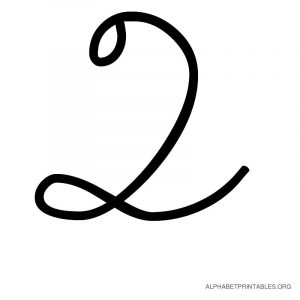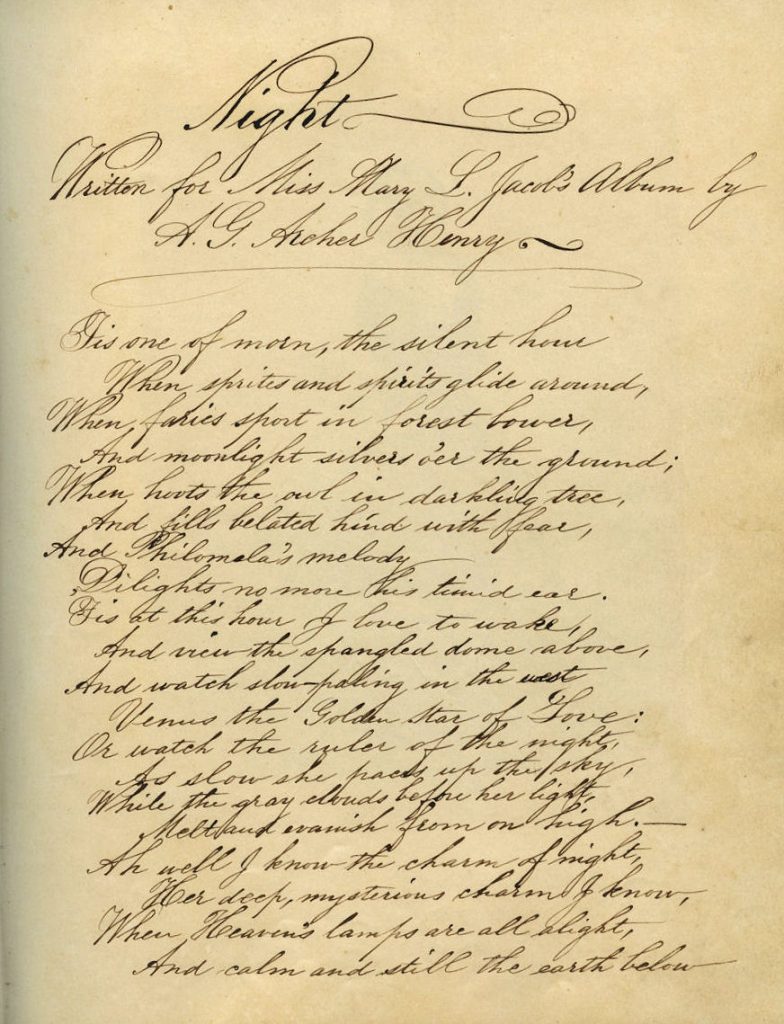Since I’ve been on a letter writing kick in 2015, I’ve been thinking more about cursive handwriting and how something that was once a mainstay elementary school lesson is becoming extinct. Although my cursive handwriting has morphed into a hybrid combination of cursive and print, handwriting and old-fashioned letter writing go hand in hand.
Do you remember the cursive alphabet cards and how they lined the wall of the classroom like a wallpaper border above the chalkboard?
Big Q, little q.
That cursive Q was the strangest letter of all, and I’m certain I never perfected it. But somehow I think trying to form those calligraphy-like letters was an important lesson, a ritual that taught fine motor skills and discipline and patience.

When I was a kid, this was a cursive Q. Someone (Thomas Jefferson?) obviously confused it with the number 2.
There was a time when cursive handwriting was considered artwork. Look at this beautifully handwritten poem from a pre-civil war autograph book (courtesy of The Graphics Fairy).
I am not an educator, but I’m a parent. A parent of children who learned cursive in the 1990s, and I’m glad they did.
I understand that life has evolved and kids have changed and there is so much to learn and so little time in the classroom. I understand. I’d also like to think there is value to learning cursive writing beyond cursive writing. Perhaps sitting in the classroom practicing that Q over and over is what helps me sit at my desk today and write even when the words aren’t flowing the way I need them to flow. Maybe something as simple as cursive handwriting is the backbone for what follows. Reading. Fine Motor Skills. Hand Eye Coordination. Writing. Critical Thinking.
But.
Don’t we have more important things to do?
We have technology now, which is life-changing and if I had to live one day without my MacBook Air and iPhone, I’d go into sweaty withdrawals. Technology includes fabulous benefits and makes sitting at my desk and typing those cursive words easy. Kids are sharp. They know things. They tell us which apps to download and fix what needs fixing.
But.
Everything comes with a price. I was an economics major and this is basic stuff. Sacrifice one thing to choose another. Trade-offs create opportunity cost. If I choose to waste two hours on Facebook, I’ve sacrificed the opportunity to write a thousand words. And if instead of spending time on Facebook, I had written a thousand words and sold the story for $200, the opportunity cost of wasting time of Facebook is greater than mere time.
In our schools, if we trade-off cursive for more time to learn programming, what are we losing? And vice versa.
I believe we grow up to be the sum of our experiences. And there were plenty of experiences, not only cursive, that I found useless or a waste of my valuable young time. Math word problems, making my bed, going to church, practicing the piano, mowing the grass. If those things had never been part of my life, I would have had tons of time to do something else. What would the opportunity cost have been? Would I be the same person I am today? Something to think about.
Bottom line. Everything we trade-off somehow affects us. Maybe it’s worth it. Maybe not.
What do you think?
Grace Grits and Gardening
Farm. Food. Garden. Life.
[tweetthis url=”http://bit.ly/19BRIY8″]Is there value to cursive writing beyond cursive writing? #opportunitycost[/tweetthis]









We lose so much when we drop cursive, and we gain so little if we trade it for programing.
What we lose: The ability to write quickly. The ability to read the Constitution in its unaltered state. The ability to read any letters from Talya. The ability to read much advertising. The ability to express our personality (our soul) on paper.
What we gain: Knowledge that will change and become obsolete before we graduate high school. Addiction to facebook.
That’s about it.
Thanks for this post! 🙂
Thanks for commenting Katherine. I think it’s important and we won’t really understand all the things we lose until it’s too late.
I wrote a thank you note to a junior high youth and was told it was hard to read because it was in cursive. It never occurred to me that cursive was quietly dropped from the curriculum in public schools. Now there is a bill in the state legislature in AR to mandate the teaching of cursive writing in the lower grades. I don’t know where the bill is … it passed at least one house and maybe waiting for the governor’s signature. I agree with all the motor skills learned and perfected with cursive writing.
Yes, Dot, I’ve been reading about the bill which reminds me of Schoolhouse Rock which reminds me of a whole other blog post for another time.
Learning to write, and practice, penmanship is more that getting words on paper. It is part of brain development at a time when the human brain is sucking up learning at an amazing rate. I still remember penmanship class in the 7th grade. Perfecting those small o’s was an exercise in concentration and self-control.Both mental and physical. It forced me to concentrate in a way that I still remember well (I am 75). Perfection might have been my personal goal, but I am pretty sure that my teacher deemed me far from that goal. I will say, though, that my cursive writing is legible because of the discipline of staying on the line, loop above the line, drop just below the line…. When I consider that experience versus the same amount of time of flying thumbs, I must say that penmanship will remain with me always.
Thanks Shirley. I remember trying to get those loops just right. I was hard on my erasers.
That’s funny. But the process was one that, for me, was valuable. As a genealogist who has spent hundreds of hours trying to decipher writing that was the key to knowing something very important in my search, writing is the KEY to knowledge. Maybe printing will be just as valuable to future generations?
oooohh… good points. You are so smart. I never thought of the experience of learning this. Now I wonder if I should sit my son down and teach him… He would probably not appreciate you for giving me the idea. 😉
I don’t know Laurie, he sounds like the creative type. Just call it art class:)
I so enjoyed your thoughts on cursive writing. I’ve been entering a manuscript I hand wrote years ago, and of course, it’s in cursive. As are the letters I’ve saved from relatives. If it were not for learning it, I wouldn’t be able to read these gems from the past. And if not for learning it, I most likely wouldn’t love writing the way I do. I agree with your points, and do hope they return the instruction in our school systems. After all, it would be slow writing for all those youngsters if they ever had to be without technology.
Thanks for your interesting post!
Thanks Lisa!
I agree that we learned much more than just forming those cursive letters when practiced writing. You made a great case for requiring it in our schools. The point about not being able to read cursive if you don’t write it is enough reason in itself. I saw where that bill passed the legislature and the governor is going to study it before signing. You should send him this post! I write much better than I print, by the way.
Found this post on Google+ today.
Your points are well taken.
Personally the biggestTake-Away is the ‘discipline and focus’ skill that is enhanced in a child learning cursive.
Latin had the same effect.
The outcome generally is a more well rounded person aho owns an ability to THINK.
Yes! At the time we don’t understand the importance of certain subjects we were “forced” to take. Thanks for reading and commenting.
For some reason I believe most of us knew the benefits.
Maybe too timid to express it publicly?
Maybe so.
Nice post! I think cursive is a form of discipline. It taught me patience and the want to improve. Unfortunately, my cursive is horrible, but no one can ever take away the experience from me. I’m glad to have grown up in an age of cursive and pre-technology. I learned how to work hard at something to achieve it, and communicate orally and in written form. Nowadays, I think writing in general has suffered with the technology trade-off, along with one-on-one communication.
Thank you for this. Besides the fact that according to etiquette books everywhere, a note of thanks should be hand-written in pen and in cursive, evidence has been shown that actually writing aids in learning. That tactile act of holding a pen/pencil and using ones eyes and ears to listen to then regurgitate information on paper helps one to retain that information better.
Talya, this is Hazel Brown from Fort Smith, how do you recommend anyone starting a blog, or potential short stories about life in a simple way, for publishers to consider, I want to try and do this, you and I discussed this before, also what events do you have coming up soon, want to visit you dear friend, peace of the Lord dear lady?❤? Appreciate not publishing, and just reply to me, thank you ma’am,